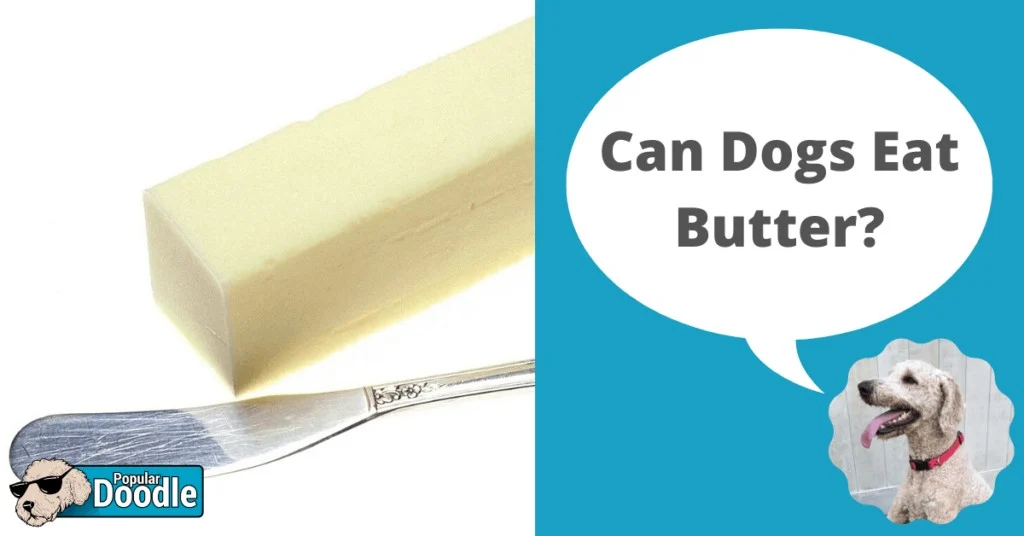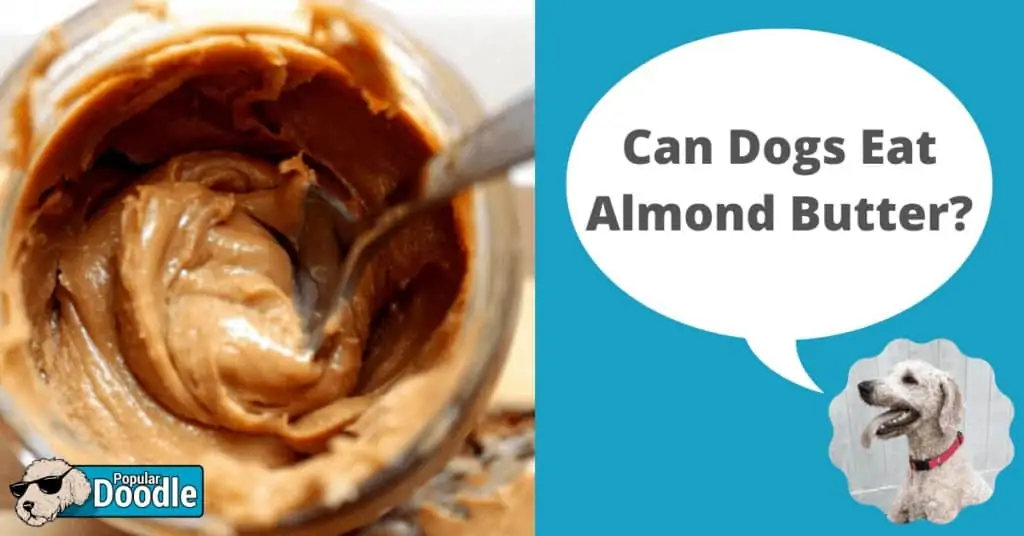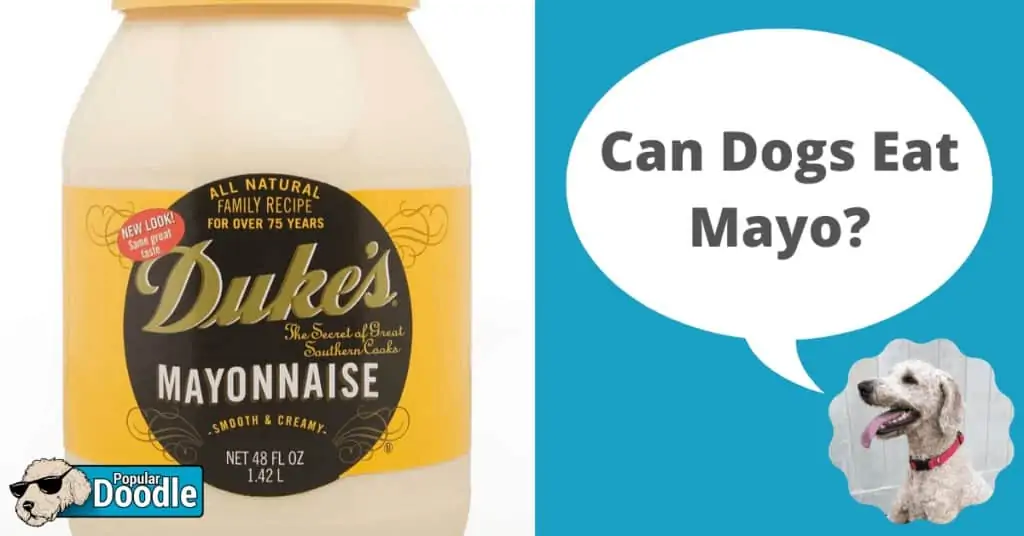
Most people enjoy butter. When something can make even Brussels sprouts taste half-decent, it must be pretty good! Butter is very versatile and can be put in or on almost any dish. The high fat content in butter often makes meals more flavorful because flavors tend to dissolve in fats. Butter could be considered a carrier for different flavors. If butter can enrich even our worst meals, can it enrich our dog’s kibble? Can dogs eat butter? Or, is butter bad for dogs?
Can Dogs Eat Butter? (The Short Answer)
No, dogs cannot eat butter! Butter does contain some important vitamins and minerals, but the negatives greatly outweigh any positives. Butter has very high caloric and fat content, which makes it a rather unhealthy option. If your dog does get some butter, you’ll be happy to know it’s not toxic to dogs and is edible…it is just really unhealthy. The high fat content may cause an upset stomach, but other than that your pup should be fine.
It’s important to remember, that even with the best of intentions, accidents happen and dogs can easily eat things they shouldn’t. Unfortunately, even if those accidents aren’t fatal, they can result in huge, unexpected veterinary expenses. That’s why we recommend all responsible dog owners get a free, online pet insurance quote from Healthy Paws.
Is Butter Good For Dogs?
No, butter really isn’t good for dogs. There are a lot of aspects of butter than make it a negative option for your dog. There is an abundance of unhealthy properties, yet there are a few minor good ones.
Butter contains a decent amount of vitamins. Butter has Vitamins A, B12, E, and K. Here’s why these vitamins are important:
Vitamin A: This is an essential vitamin because the body cannot produce it on its own and therefore it must be part of the diet. It is essential for proper functioning of the skin, coat, muscles, and nerves.
Vitamin B12: Vitamin B12 is essential for the nervous system and the brain. It is also important for intestinal health and the formation and growth of blood cells.
Vitamin E: This is important for strong and healthy muscles! It also plays a role in the functioning of the circulatory and immune systems. As an antioxidant, it also contributes to eliminating free radicals.
Vitamin K: This vitamin is crucial for allowing blood to clot properly.
In addition to those vitamins, butter also contains riboflavin, also known as vitamin B2, which is essential for regulating cellular metabolism and promoting proper growth. Deficiencies in riboflavin can cause impaired growth rates, anorexia, weight loss, ataxia, and death.
Along with vitamins, butter also contains minerals including calcium and phosphorus. Calcium and phosphorus are both important in supporting good bone and teeth health!
Is Butter Bad for Dogs?
We’ve already answered the question, “can dogs eat butter?” Now, let’s learn about the dangers of feeding your dog this food! Is butter bad for dogs?
Yes, butter is bad for dogs. Butter contains few real health benefits for dogs while also containing a lot of negative aspects. For starters, butter is a very high-calorie food. There is 102 calories in just a single tablespoon of butter! It also has high levels of cholesterol which isn’t healthy either.
Additionally, butter is a dairy product and contains milk. This can cause problems because many dogs are lactose intolerant—so ingestion of butter could lead to symptoms such as diarrhea.
In one tablespoon of butter, there are 12 grams of fat, including 7 grams of saturated fat! Even just a small amount of butter would push your dog way over their recommended daily fat intake. Increased fat in your dog’s diet is likely to lead to obesity, diabetes, and/or pancreatitis. Obesity can lead to multiple other health problems, as excess weight negatively impacts most organ systems in some way. Obesity is also a leading cause of developing diabetes. Diabetes can be tricky to manage and can even be deadly if it’s not managed properly. A diabetes diagnosis would require a diet change, increased exercise, and insulin injections. Needless to say, it’s better to be proactive! Additionally, pancreatitis is an especially painful disease. The pancreas is an integral part of breaking down fats. When a lot of fats are ingested and the pancreas has to help digest them, it starts secreting enzymes rapidly which causes the pancreas to become inflamed. Signs of this include pain, vomiting, and fever. Factors such as increased age and diabetes can make it harder for dogs to recover from this.
Many dogs have eaten butter and end up completely fine, but that doesn’t mean you should give your dog butter. Smaller quantities of butter shouldn’t cause too many problems if accidentally eaten. Your dog may have some digestive issues or they might not exhibit any symptoms. However, just because it isn’t lethal to dogs doesn’t mean you should give your dog butter. There are so many other healthier options to give your pup!
Other Varieties & Related Foods:
Can Dogs Eat Butter Popcorn?
No, dogs should not eat butter popcorn. While popcorn can be safe for dogs, butter is not! Any butters, oils, salts, or other flavorings can be potentially dangerous to dogs. The butter just adds a lot of calories and fat that make it an unhealthy choice. Plain popcorn by itself can be a tasty occasional treat for your pup!
Is Garlic Butter Safe for Your Pup?
No, your four-legged friend can not eat garlic butter. There are two big issues with garlic butter—the garlic and the butter. It’s been established that butter is unhealthy for dogs. Additionally, while you may love garlic, dogs metabolize it differently than humans which makes it toxic to dogs. Garlic contains thiosulfate which causes oxidative damage in dogs, meaning it damages red blood cells and causes hemolytic anemia. This is when red blood cells are destroyed faster than they can be made, which leads to a very dangerous situation.
Can Dogs Eat Margarine?
No, dogs also cannot eat margarine. Margarine contains 102 calories per tablespoon and 11 grams of fat, making it just as unhealthy as butter. In addition, margarine can contain additives and preservatives which are not healthy for dogs.
Can Dogs Eat Butter Cookies?
No. dogs shouldn’t eat butter cookies. They’re unhealthy and contain even more calories than just butter—but that may not even be the biggest concern. Most butter cookie recipes contain vanilla extract or imitation vanilla. Surprisingly, this has a high alcohol content that can be toxic to dogs. Dogs cannot break down alcohol in their system which could lead to alcohol poisoning. However, alcohol-free vanilla that uses vegetable glycerin is safe for dogs. If you find that specific type of vanilla, technically a butter cookie should not cause severe harm to your dog, but it still is very unhealthy so it’s advisable to avoid them regardless.
Can Dogs Eat Soy Butter?
Yes! Soy is a common ingredient in many dog foods, so it is safe for dogs. Be wary though, because some dogs are allergic to soy. Some symptoms of a soy allergy include ear infections, obsessive licking, hair loss, vomiting, and diarrhea. If your dog does have a soy allergy, soy butter is not safe for them. Soy nut butter is essentially a peanut butter substitute made out of roasted soybeans. Like most foods, only share in moderation!
In Conclusion: Can Dogs Eat Butter?
No, your dog “butter” not eat it! It does contain some important vitamins and minerals, but that is nothing compared to the quantities of fat and calories in butter. With little health benefits and a lot of complications from excessive intake of fats, it’s best not to share butter with your furry friend. If you discover your mischievous pup did get some butter, you shouldn’t need to worry as it’s just unhealthy, not toxic. Although it’s not toxic like a lot of other foods, there are still so many better options!
Want to Learn More?
Check out these related articles from our “Read Before You Feed” series for more advice on safe foods for dogs!
- Can Dogs Eat Almond Butter?
- Is Hummus Okay for Dogs?
- Can Dogs Eat Peppercorn?
- Can Dogs Eat Basil?
- Can Dogs Eat Cilantro?
Disclaimer: We are not veterinarians and this article should not be taken as medical or veterinary advice. If you have any questions about your pet’s health or dietary needs, please contact your local veterinarian.








